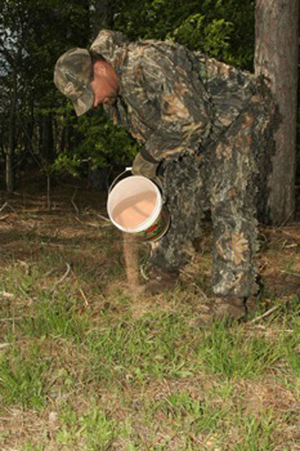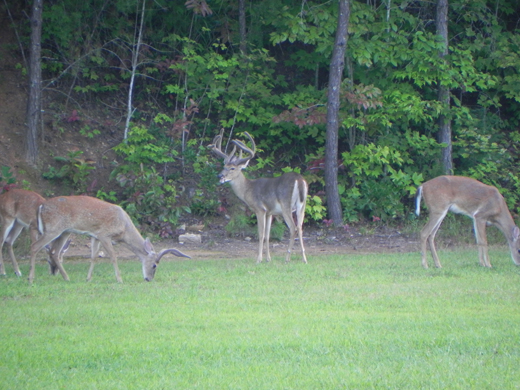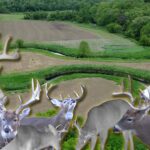LAST UPDATED: May 1st, 2015
I still remember the first time I hunted in Texas. The first day of hunting started with me climbing inside a ground blind before daylight and waiting for Porky the pig to show up. I was told by the outfitter that the place was overrun with pigs and I wouldn’t have a problem seeing and shooting many pigs. About half an hour after daylight, I saw a pig off in the distance and wondered why I hadn’t seen the truckloads of pigs I was promised to see when the sun came up.
Does this image upset you? Do you consider it part of the “hunting” process?
Dinner Bell
Then it happened. I heard a noise that all Texans, people who have hunted in Texas, and all wildlife in Texas are familiar with: the sound of a corn feeder. The corn feeder was only running for a minute or less but in the next five minutes, I saw something I hadn’t seen before. The bushes came alive. Every deer, pig and rabbit within a square mile came running to the feeder like a group of kids running to the kitchen when Grandma announces that fresh cookies are on the table. Within a half hour, all the corn had been devoured and the animals had disappeared back into the brush like thieves in the night. Is this style of hunting wrong, unethical or a disaster waiting to happen? Maybe; maybe not. Some people think hunting deer over bait is wrong but hunting pigs over bait is okay. Others think baiting is wrong altogether. What is wrong and right is difficult to determine.
Where should hunters draw the line in order to put themselves in position for a shot?
In my home state of Michigan, baiting was legal with very few restrictions for decades until a case of Chronic Wasting Disease (CWD) was found in the state several years ago. Until CWD was found, those with the largest bait pile won. Some people only hunted over small bait piles that they started at the beginning of archery season. Others fed deer all year and when deer season opened, they hunted over the area they fed the deer. Some hunters took it one step further and would drop dump truck loads of carrots and sugar beets into the woods in an attempt to attract deer from miles around to their bait sight. Some hunters hunt over bait because they think it makes hunting easier. Some hunt over bait because that is how Grandpa taught them to hunt. For every person that baits, there are hunters who think it makes hunting too easy and is unfair.
What Does Science Say?
From a biological standpoint, there is a lot wrong with baiting. Just as Brent Rudolph from the Michigan DNR said, “Some of the research we have done over the years indicates that hunters bait to bring lots and lots of deer to a certain area. The goal is to harvest deer at the sight but in many cases, only one or two deer are taken and sometimes none are taken. When you have many deer coming to one spot repeatedly, you increase the probability of diseases being spread. You never want deer concentrated in one area and that is what happens when hunters bait deer.”
Do you consider this “Baiting”? Do food-plots cause the same problems as feed-type baiting?
Another problem associated with baiting is if people are doing lots of baiting, deer numbers can increase in certain areas. “Hunters can sustain deer numbers higher than what the habitat can support which isn’t a good thing. Concentrating deer in a certain area can result in heavier browsing which can affect forest regeneration,” Rudolph said. When the bait is gone, the deer may eat everything in the area which can be devastating to young trees in the area. This only happens when baiting is done on a large scale, but baiting is done on a large scale across America.
Catch 22
In many cases, baiting causes deer to become nocturnal which isn’t good for hunting or for biologists trying to manage a deer herd. “It has been observed that deer become nocturnal when being hunted over bait because they get educated and learn that humans are present. This can make hunting more difficult and result in fewer deer being taken,” Rudolph said. Baiting is seen as the easy way to take more deer when it can have the adverse effect.
Dollars and Sense?
After reading this, you may think what good can come from baiting? It is difficult to find the silver lining, but there is an extremely thin silver lining and it all boils down to economics. In the Midwest, it is hard to find a gas station that isn’t selling bagged carrots, corn and sugar beets. Every convenience store in Michigan sells deer feed throughout the fall. When hunters stop to pick up bait, they also pick up food, gas and other products that make the cash register sing. Just in Michigan, the dollar sales of bait reach into the millions each year.
Bait affects the economy in other ways. “When we first implemented the baiting ban after the case of CWD was found, we saw a drop in hunter participation because hunters couldn’t bait,” said Rudolph. Right, wrong, or otherwise, hunters gave up hunting when they weren’t allowed to hunt over a pile of bright orange carrots. Hunting license sales make every state in the nation millions of dollars. The last thing any hunter should want to see happen is hunter participation to fall off when hunter numbers are already on the decline. Remember there is strength in numbers. Baiting makes hunters lazier but I prefer lazy hunters over no hunters.
Michigan recently passed a law that allows hunters to use a small amount of bait and it must be spread over a large area to reduce the chances of diseases being spread. In some states, you can still pour out buckets of feed daily. For example, in states like Texas, a whitetails daily movement is altered by feeders and the corning of roads. Is that a bad thing? You are probably saying yes if like me, you hunt without bait. Baiting can make hunting without bait more difficult because the hunter with the bait pile might see more deer than the hunter without.
Personally
I have hunted all over America; in places where bait was as much a part of the landscape as treestands and box blinds. I have also hunted in places where saying the word bait was like wearing an Obama shirt at a GOP fundraiser. It is difficult for me to take a side. I rarely bait because the statistics show that hunters seldom kill big bucks over bait. Then again, is a food plot considered bait? If it is, many of us bait. A food plot is an attractant, right? A food plot is built in order to draw deer to a certain area, right?
Talking and writing about baiting can be a slippery slope. Some of you reading this are probably thumbing your nose at anyone who baits while others are in favor of baiting. I understand both sides of the argument. I see why biologists lie awake at night worrying about the devastating affects baiting can have. At the same time, I understand why every gas station owner from here to the Canadian border wants to sell it. I also understand why some folks prefer to hunt over bait. For many, baiting is a big part of hunting. It is tradition. Like habits, traditions are hard to break.
Are you for or against baiting … or are you on the fence? Let us know your thoughts.
Baiting Alternative?
Even if you disagree with baiting, one thing is certain: using an attractant during the summer when bucks are growing antlers is a great way to get bucks in front of your game camera. If you haven’t considered using minerals and they are legal in your region, try them! Minerals can help antler growth, they don’t rot, and they last for months.
Heartland Wildlife Institute, Whitetail Institute, Lucky Buck, and others make great deer mineral products.
Editor’s Note: Tracy Breen has been diagnosed with cerebral palsy and often writes and speaks about overcoming physical challenges in order to enjoy the outdoors. At 34 years of age, Tracy is one of the youngest full-time outdoor writers in America. Learn more about Tracy and his hunting adventures at tracybreen.com.

 By
By 





